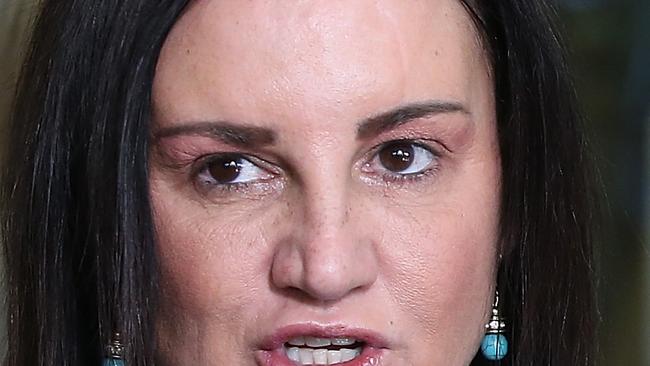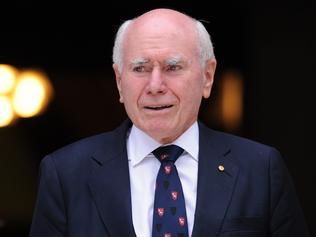Budget 2017: John Howard ‘uneasy’ about new bank tax
John Howard and Peter Costello believe the budget has been shaped to fit the populist demands of the Senate.

John Howard and Peter Costello, the team that restored the budget to surplus and wiped out national debt, believe Scott Morrison’s budget has been shaped to fit the populist demands of the Senate and fails to look at long-term debt.
Mr Howard last night told The Australian he understood why the Turnbull government had proposed a big bank tax and regulation of bank executives, but he felt uneasy about the moves.
“I’m uneasy about (the bank levy) ... and I understand banks do pay company tax ... but the arguments against the mining tax applied by (former Labor treasurer) Wayne Swan can be applied here with equal force,” Mr Howard told a PwC post-budget event in Melbourne yesterday.
“It’s not a levy on banks, it’s a tax on banks.”
The Liberal Party’s second-longest serving prime minister and longest-serving treasurer acknowledged Mr Morrison’s budget broke from their early standards but conceded it had been devised to pass the Senate and did not do enough to pay back debt, which stands at $600 billion.
Mr Howard said he understood a “different path” had to be found to get spending cuts through the Senate. “The path of banging your head against a recalcitrant Senate door was not going to be successful and a different path had to be chosen,” he said.
At a PwC post-budget breakfast in Canberra, Mr Costello backed the Turnbull government’s $6.2bn slug on the big banks but warned not enough was being done to repay Australia’s debt.
“The plan is that as the economy grows, the (ratio of) debt to GDP will fall,’’ Mr Costello said.
But he warned that the projected surpluses in the budget were not enough to pay back debt and bemoaned that “no one is talking about paying back debt”.
Mr Morrison plans to raise the federal debt ceiling from $500bn to $600bn and expects gross debt to reach $606bn.
Mr Costello criticised the creation of new taxes after the government proposed a rise in the Medicare Levy to fund the National Disability Insurance Scheme, and the bank tax.
Mr Costello told The Australian he had warned many times against new taxes and believed there were “no good taxes”.
The former Liberal deputy leader, who restored budget surpluses and won the AAA credit rating for Australia, told the Canberra breakfast that the government was relying on economic growth to reduce debt as a share of the economy.
“There is no such thing as a good tax; there are only less-worse taxes such as the GST,” he said.
But Mr Costello strongly backed Mr Morrison’s decision to impose a 0.06 percentage point levy on the liabilities of the five biggest banks as part of a politically smart budget.
Even Mr Swan, Mr Costello’s long-term opponent and Labor’s longest-serving treasurer this century, said there needed to be more focus on cutting debt.
While “absolutely” backing the new levy on the big banks Mr Swan said the tax demonstrated that big corporations and banks “do not need a $50bn tax cut”. “The government contradicts itself with this tax and needs to take more real measures about reducing debt,” Mr Swan told The Australian.
But Mr Swan vigorously denied Mr Morrison had delivered a “Labor budget” describing the idea as “horseshit”.
Mr Howard said that after failing to get spending cuts through the upper house, the government had to find measures Labor would not oppose, such as the banking tax.
“It’s my belief that after having tried unsuccessfully to secure passage through the Senate of a series of expenditure measures or expenditure reduction measures, the government came to the conclusion ... it had to adopt a different path,” he said.
The Turnbull and Abbott governments had had a much more difficult time negotiating with Labor, the crossbench and the Greens, than he ever had with the now-defunct Democrats, Mr Howard said.
“It’s chosen some paths that in other circumstances a Coalition government may not have chosen and there will be understandable criticisms of that, and I’ve expressed my unease about some aspects of it,’’ he said. “But I don’t express unease about the fundamental decision that the government has taken.’’
Tony Abbott also strongly backed the budget yesterday, which extended help for small businesses in his 2014 budget, and said “there was a lot to support in the budget”.
He said Australians should wait and see whether the banks would pass on increased costs from the levy to customers and investors.
“Let’s see if the banks are fair dinkum about improving their standing with the public,’’ Mr Abbott said. “They will try to ensure that they absorb this. In the end it’s their call.’’



To join the conversation, please log in. Don't have an account? Register
Join the conversation, you are commenting as Logout